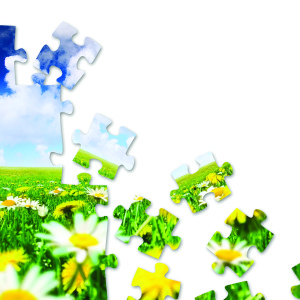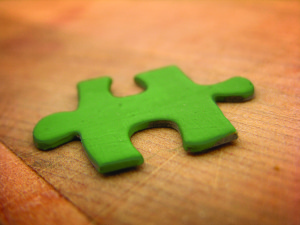Dumbbells for the brain? | by

Jigsaw puzzles can hone cognitive function, trigger good feelings

“We focus so much on exercise for physical health, but people forget to take time to sit down and play a game or do a puzzle to stimulate their brain,” says Jim Nguyen, a psychologist with Spalding Rehabilitation Hospital. “It’s important.”
Carole Hull, vice president of resident care for Denver-based Spectrum Retirement Communities, says jigsaw puzzles are particularly beneficial in the company’s independent, assisted living, and memory care residences.
“Jigsaw puzzles are huge here. Any time you walk through you can see residents working on one,” she says. “They exercise that part of the brain, the frontal lobe, which controls your ability to reason, make judgments, and figure out complex situations.”
They also challenge visual processing (where in the big picture does this piece fit?), memory (where did I just see that piece?) and motor function (which tends to decline with age). And for many, they hold a sense of nostalgia that can trigger memories. “Jigsaw puzzles are something this age group did with their loved ones years ago. They are still very meaningful to them,” says Hull.
Nguyen, who works with trauma and stroke patients, says he urges patients to do puzzles of various kinds as soon as possible after their incident. “The earlier you start, the better the outcome.”
For the best bang for your brain-building buck, try sampling a variety of different kinds of puzzles (word, number, and jigsaw) which tax different parts of the brain. Ramp up the difficulty level over time (if possible, trade your basic 100-piece kitty-cat for an elaborate 500-piece castle). And, invite a friend, spouse, or grandchild to do it with you.
“Just being connected to another person, from both an emotional standpoint and a cognitive stimulation standpoint, has a huge benefit,” Nguyen says.
Learn about custom made, specialty and rare Colorado jigsaw puzzles: https://healthwellnesscolorado.com/a-piece-of-history/
In some recent studies:
Researchers divided 2,832 healthy 65-plus adults into groups. One group underwent 10 sessions of puzzle-playing during a six-week period followed by occasional “booster sessions” during the 10-year study. One group did not play puzzles. A decade later, the puzzle-players showed significantly less decline than their peers when it came to reasoning and speed of mental processing. – January Journal of the American Geriatric Society
- Investigators found evidence that people who challenged their brains with puzzles in midlife were less likely to accumulate neuron-strangling amyloid plaque (the culprit behind Alzheimer’s disease) in their brains down the road. – University of California, Berkeley
- Researchers, looking at MRI brain scans of middle-aged adults, found that regular puzzle-players had a bigger hippocampus (the area of the brain involved in memory forming, organizing, and storing). They also scored higher on cognitive tests. – Wisconsin Alzheimer’s Institute
Tags: puzzles, Spalding Rehabilitation Hospital, Spectrum Retirment Communities
Comments
Leave a Comment
Please be respectful while leaving comments. All comments are subject to removal by the moderator.


Has there been a study in which a control group that did not do puzzles was compared with one that does do puzzles to see what is the effect on resistance to dementia? I would like to read such a study if you can provide a citation to it. Thanks in advance.
Albert
In my immediately prior comment, I should have mentioned that I did see your reference to the “January Journal of the American Geriatric Society” but I did not see what year it was published.